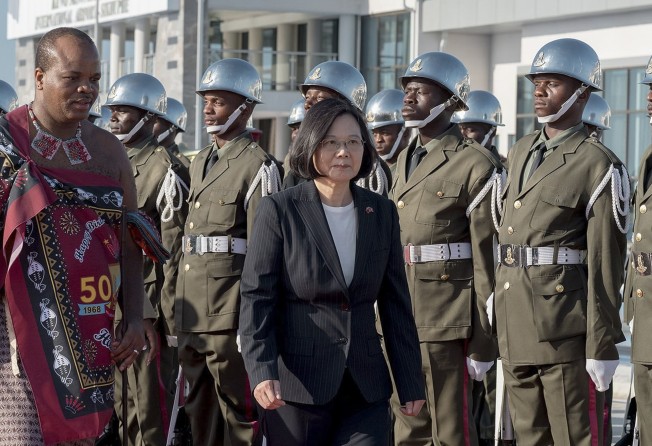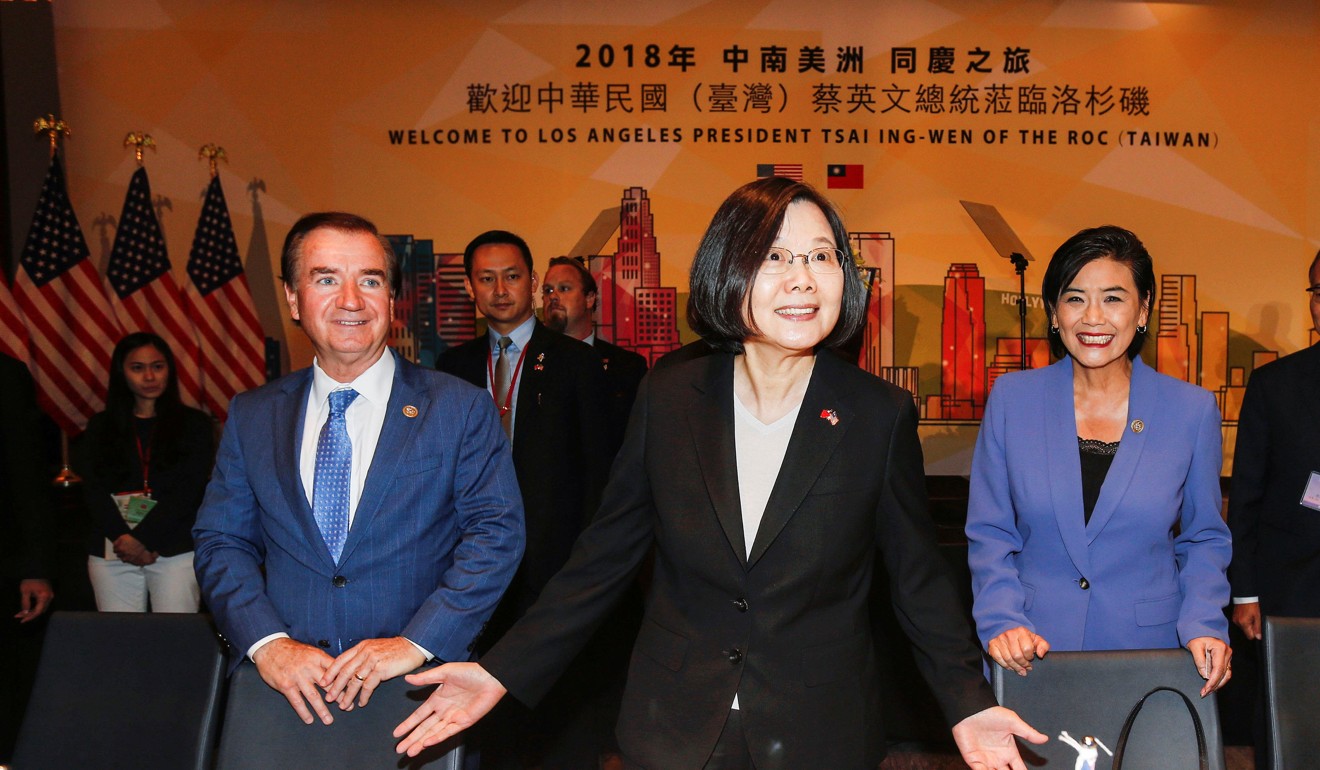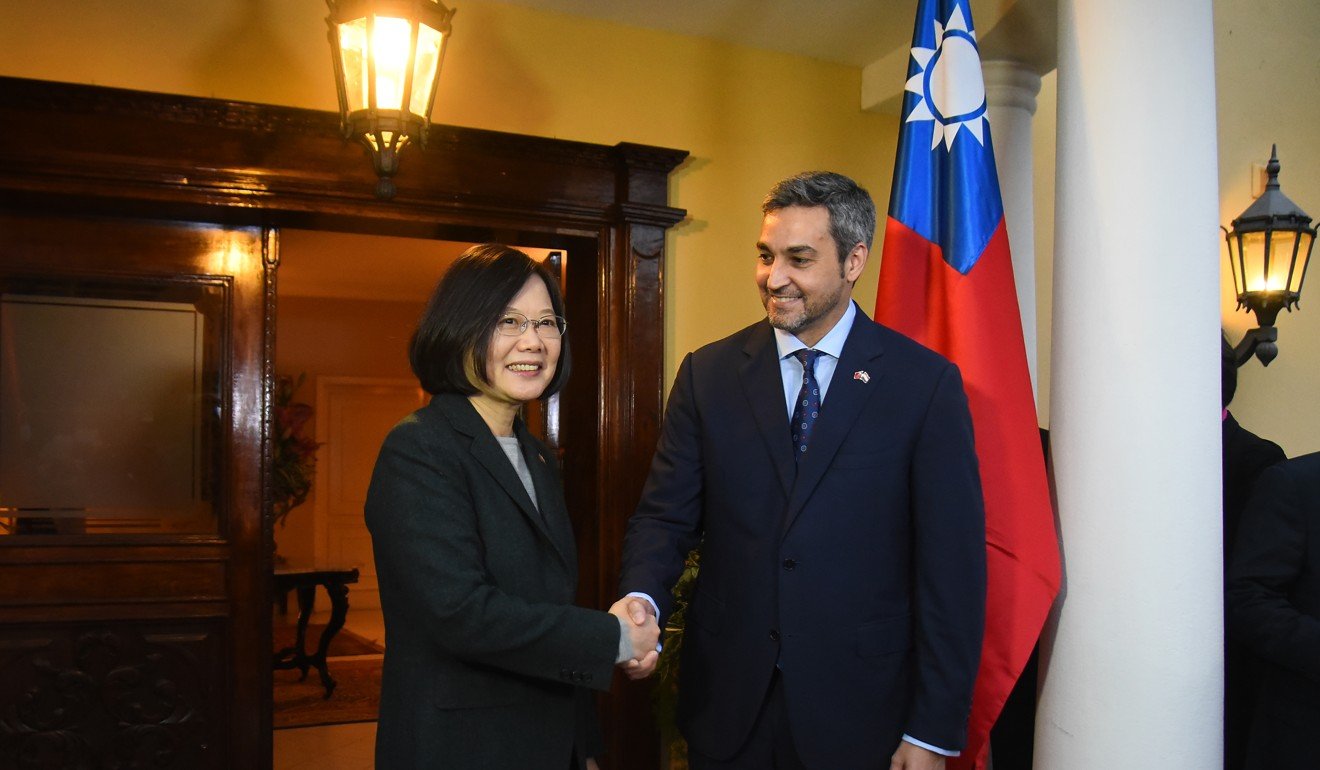Should Taiwan be worried if it loses all its allies?
With El Salvador the fifth nation to break ties with the self-ruled island since Tsai Ing-wen took power, Taiwan ‘must do everything it can’ to retain its remaining allies, analysts warn

Taipei must do all it can to resist Beijing’s diplomatic squeeze and retain its 17 remaining allies or risk losing its sovereignty if the number shrinks to zero.
That was the warning from analysts on Taiwan after El Salvador became the fifth ally to switch diplomatic recognition from the self-ruled island to Beijing since Tsai Ing-wen of the independence-leaning Democratic Progressive Party took over as leader in 2016.
The latest switch has left Taipei with 17 allies, down from 22 just over two years ago and 70 before the United Nations recognised Beijing as China’s sole representative in 1971.
Taipei has been losing allies much faster under Tsai than under the island’s previous leader, Ma Ying-jeou, of the mainland-friendly Kuomintang.
The losses are also on track to be higher than when Tsai’s DPP predecessor, Chen Shui-bian, was in power. Between 2000 and 2008, Chen lost nine allies but he also developed ties with three countries.
Beijing considers Taiwan a wayward province subject to eventual unification with the mainland, if necessary by force and Tsai’s losses have come as a result of Beijing’s pressure.
Beijing has ramped up its campaign to woo away Taipei’s allies in an attempt to force Tsai to accept the “one China” principle, which Beijing sees as the political foundation for continued cross-strait exchanges.
Tsai has so far not acknowledged the principle and with no sign of her changing her mind, concern is growing over the fallout for Taiwan if all of its allies eventually abandon it.
A day after El Salvador switched ties to Beijing, Ma urged the Tsai government to “do something to stop losing more allies”.
He said the Tsai government must be mindful of the importance of holding on to its allies to maintain Taiwan’s sovereignty and global status.
Ma said the breaks were concerning because they were not with Tsai or her DPP but with the Republic of China – Taiwan’s official title. “They may never reinstate official ties with us,” he said.
But some DPP supporters have suggested that Taiwan would be better off losing all its allies, freeing the island from the financial and economic aid it supplies to mostly impoverished African and Latin American countries.
Deputy foreign minister Wu Chih-chung said last year that Taiwan spent about NT$9 billion (US$293 million) a year in its economic cooperation programmes with its Latin American allies.
Some pro-independence supporters have also argued that Beijing’s stepped-up efforts to isolate Taiwan diplomatically will spur the island to formalise its autonomy.

Former premier and DPP chairman Yu Shyi-kun said that even if Taiwan ended up with no diplomatic allies in its present form as the Republic of China, it could gain allies as an independent Taiwan.
“The fewer countries [that] recognise the Republic of China, the more likely Taiwan’s diplomatic allies would show up,” he said.
But analysts said this approach would be risky.
“By the time Taiwan is left with no more allies, it does not necessarily mean it could drop its ROC title just like that, or simply declare independence so that other countries could recognise it,” Philip Yang, director of the Taiwan Association of International Relations, said.
“The moment Taiwan declares independence, China will have the best excuse to send forces to attack [it].”
Taiwan’s sovereignty would also be at stake if no countries recognised it, he said.
But even if it had no allies, Taiwan would not become a territory like Hong Kong, because it had its own military and political system, including democratic presidential elections, analysts said.
Rather, it would affect Taiwan’s ability to take part in international activities, especially if Taiwan were no longer a member of international society.
For instance, if the World Health Assembly held an international conference to solicit ideas for dealing with a global virus, Taiwan could be shut out and deprived of first-hand information because no other countries supported its desire to take part, they said.
“If we were stripped of all allies and were unable to attend any international event, things like that could happen and create problems for us,” said Huang Kwei-bo, director of the Centre for Foreign Policy Studies at National Chengchi University.

Taiwan is a member of more than 150 international organisations, including 37 major groups like the World Trade Organisation, the Asia-Pacific Economic Cooperation forum, the International Olympic Committee and the Pacific Economic Cooperation Council. While 12 international organisations still allow the island to use its official title ROC or Taiwan, a number of those groups have abruptly changed the island’s title to Taiwan-China, Taipei-China, and some even to Taiwan, province of China.
According to the island’s foreign ministry, Taiwan is trying to join various global economic groups as well as sign bilateral free-trade agreements as part of its efforts to secure its international rights. It is also rallying support from the United States, European Union and other like-minded countries for its bid to join key groups like the World Health Organisation, and secure its membership of major international groups.
Although not all international organisations would be of interest to Taiwan, the island’s continued participation in meetings and events would give it invaluable insight into the setting and content of the international agenda.
“If we were left out from international organisations, not only would our decision makers be unable to learn new concepts, [but] our overall decision-making system might go wrong too,” Huang said.
He said the government must do as much as it could to secure its status in various international groups.
Wang Kung-yi, a professor of political science at Chinese Culture University in Taipei, said that although Washington did not maintain official ties with Taiwan, it wanted the island to keep as many allies as it could, especially in Latin America.
“That’s the US’ backyard. The last things Washington wants is for Taiwan to be left with no more allies in Latin America,” Wang said. Taiwan has nine Latin American allies.
Soon after El Salvador’s diplomatic switch, the White House accused Beijing of interfering in El Salvador’s domestic politics and criticised San Salvador for a “non-transparent” decision that would affect the economies and security of the entire American region.
Spokesman Alex Huang confirmed that Taipei was considering all possibilities, including the loss of all of Taiwan’s diplomatic allies.
Foreign Minister Joseph Wu has also said Taiwan will do everything possible to persuade all like-minded countries to maintain security and stability in the Indo-Pacific region to counter military expansion and growing threats from China.
In the past week, Tsai told visitors, including those from the US and Japan, that Beijing’s suppression of Taiwan had upset the status quo and affected regional stability.